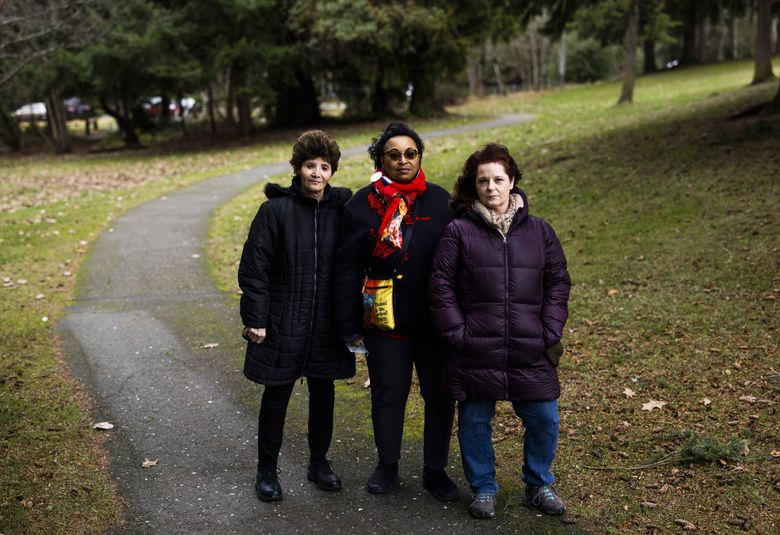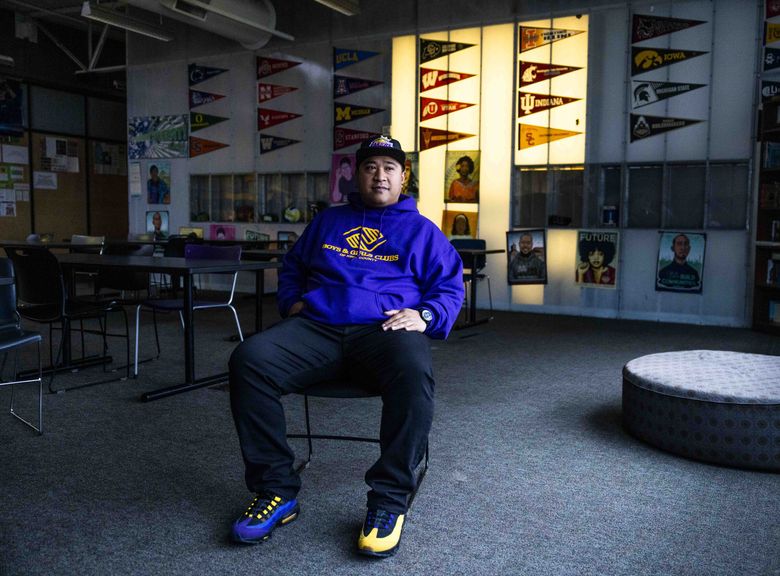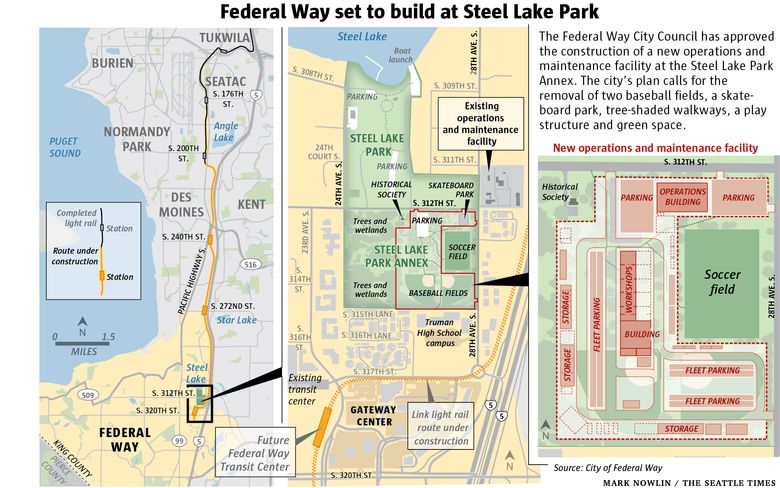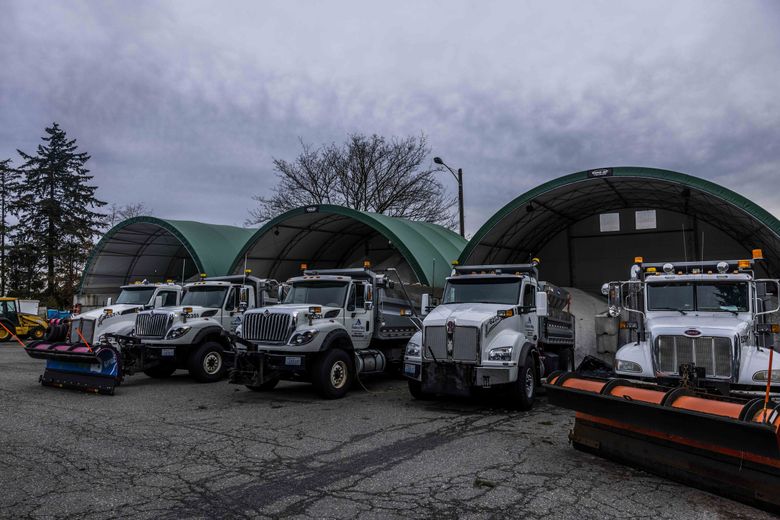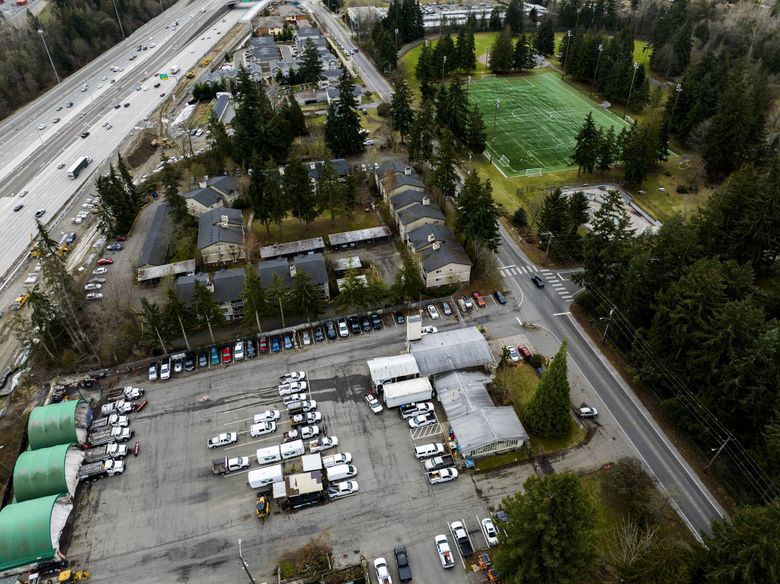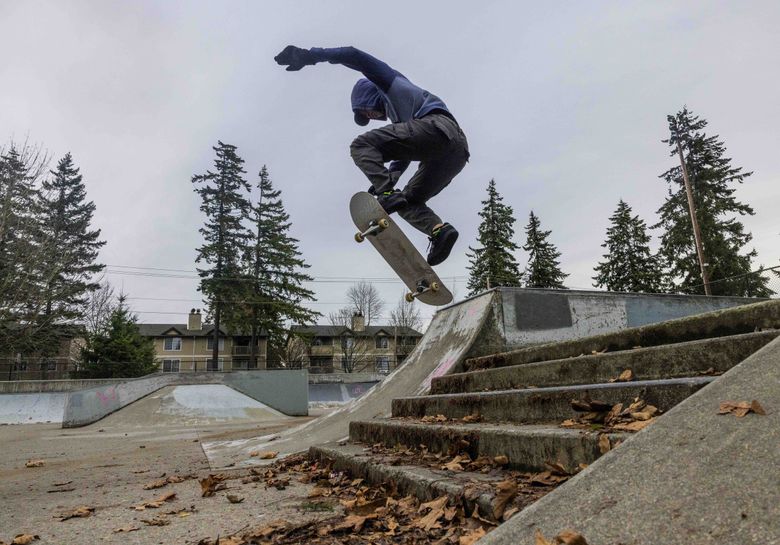FEDERAL WAY — A new downtown is emerging in Federal Way, where a performing arts center opened not long ago, a Link light-rail extension is under construction and the city hopes to develop a bustling public plaza surrounded by shops, restaurants and hundreds of new apartments.
But some residents say the strip-mall suburb between Seattle and Tacoma could mar its maturation by bulldozing 11 acres of a nearby park to build a new operations and maintenance facility for city workers and trucks.
The project has stirred debate over the past year as Federal Way — like other Puget Sound suburbs trying to reinvent themselves as transit-oriented hubs — wrestles with how best to grow. The city’s population recently hit 100,000.
“They shouldn’t be able to come in and take a park away like that,” said Marie Sciacqua, a retiree who spends time at the park. “The city is going to be growing in this area. The kids need a place to play.”
Approved by the City Council in a split vote last summer and scheduled for construction in 2024 — unless state requirements get in the way — the plan to build at the Steel Lake Park Annex calls for removing two ballfields, Federal Way’s only skatepark, tree-shaded pathways and a play structure. The Federal Way Historical Society and a soccer field would remain in place.
Proponents contend building at the park is the cheapest, quickest way to get employees out of the cramped and dilapidated facility they currently use. They say the lost parkland can be mitigated by creating a new skatepark elsewhere and by improving ballfields in another neighborhood. Yet critics have raised equity concerns, arguing the project will reduce recreation options in an area that needs more connections with the outdoors, not fewer.
Not only is the Steel Lake Park Annex walking distance from a light-rail station that’s supposed to open in a few years, but the site also is close to housing complexes for seniors and families — plus a high school, a preschool and a teen center. The census tract is 78% people of color, with a median household income of about $55,000, which is about $50,000 below King County’s median, according to census estimates.
“I would love to hear how many of our elected officials went and knocked on doors” at the housing complexes around the park to ask about the plan, said Cynthia Ricks-Maccotan, a longtime Federal Way community advocate who serves on the board of the Boys & Girls Clubs of King County.
The project looked like a done deal last July, when the council voted 4-3 to select the park as the site for the new operations and maintenance facility and authorized $250,000 for design work, despite a public comment session dominated by residents with doubts about the concept. The plan advanced further in November, when the council budgeted $42 million for the project for 2024, based on the assumption that the city will issue bonds. The city could sell the site of the existing facility or retain it for another use.
“We’ve been working on this a long time,” Public Works Director E.J. Walsh told the council in July. “This is not a spur of the moment decision.”
But an apparent surprise popped up last month, giving opponents some cause to believe the project could still be stopped or altered. The state’s recreation and conservation agency, which heard about the plan from Sciacqua, says the city must replace any park losses with land and amenities of greater or equal value and get permission from the National Park Service, because the Steel Lake Park Annex was created partly with federal funds.
Beleaguered facility
Everyone agrees that Federal Way needs a new operations and maintenance facility for its parks and public works employees sometime soon, considering how bad the conditions at the current facility have become. Located kitty-corner from the Steel Lake Park Annex (and across the street from Steel Lake Park proper, which includes a swimming beach), the property consists of an old fire station, an old house and a parking lot with a steep slope.
The facility’s offices and locker room are a base for more than 60 full-time and seasonal employees who take care of the city’s parks, roads, drainage system and emergency operations. Their trucks are stored at the site, along with other vehicles, equipment like snow plows and mounds of de-icing salt.
In the station, where ceiling tiles have tumbled down, employees assemble for work under dim, blinking lights and make repairs in an outdated garage. The house’s primary bedroom has been converted into an office. In the lot, vehicles are double and triple parked. Thieves have broken in more than 20 times in the past few years, causing more than $250,000 in expenses.
Some employees have worked out of trucks, sheds and trailers since COVID-19 hit, to avoid workplace crowding. The crews lose precious minutes each day shuffling vehicles around the parking lot to access what they need, “kind of like Tetris,” Walsh said on a recent tour, and costly equipment is stored outside in the rain.
“These are professional people who work hard every day and they deserve better,” Parks Director John Hutton said last summer, urging the City Council to build a new facility at the Steel Lake Park Annex rather than other sites.
In a 2021 report, a consultant hired by the city scored the Steel Lake Park Annex site better than three other options, partly because those options, including the site of the existing facility, would involve buying property in a Federal Way real estate market where prices are high and large parcels are very scarce. To accommodate a larger facility at the existing site, the city would have to purchase and raze some neighboring houses, the report said.
In a memo, the city estimated the price tag for building the new facility at the Steel Lake Park Annex would be at least $34 million, including $1 million to mitigate the loss of park amenities — versus at least $41 million to expand and build at the existing site and even more to build at a different site that would have to be acquired. The estimates didn’t include design costs and debt service.
For Hutton, a longtime parks advocate, removing green space “kind of goes against the handbook,” but the conditions at the existing facility are putting employees in danger, he said last month. At this point, he said, building at Steel Lake Park Annex is the smart thing to do.
“Don’t pave our park”
Not so, argues Suzanne Vargo. Striding through the Steel Lake Park Annex on a blustery winter day, the Federal Way activist bubbled with outrage. The 11 acres look small on a map but larger in person, with a grassy lawn that sprawls between the turf soccer field and a wetland zone.
“Trees are going to go away. Fields are going to go away. They’re going to hide this soccer field” by building around it, said Vargo, arguing that the plan clashes with the city’s growth and sustainability goals.
Seniors visit to exercise, and students take mental health breaks there, crossing into the park directly from the Truman High School campus, an alternative learning community with no sports fields of its own. The Boys & Girls Clubs teen center, which is housed on the campus, uses the park for nature walks and the ballfields to play dodgeball, kickball and flag football, especially in the summer, said Duwayne Le’i, the center’s operations director.
Most kids who spend time at the center can’t afford to join sports teams in organized leagues, so the chance to play for free is important, said Le’i, who praised Federal Way leaders for supporting the center in general, though he didn’t know about the city’s project until contacted by The Seattle Times.
“They’re coming from low-income families. We get a lot of foster kids that we serve. They don’t really have anywhere else to go,” he said.
The City Council meeting in July lasted hours, partly because an unusual number of people shared public comments, mostly asking the council to consider sites other than the Steel Lake Park Annex. Skateboarders described the park as a second home that’s kept kids out of trouble, while others talked about baseball and softball competitions.
“Don’t tear up this nurturing green open space and replace it with loud, rumbling, heavy equipment, electronic warning beeps and engine exhaust right in our backyard,” said Laura Anderson, a Truman High employee who mentioned that students use the Steel Lake Park Annex as a backdrop for their senior photos and other activities. “Please don’t pave our park.”
Two council members, Susan Honda and Linda Kochmar, expressed similar concerns, and a third, Erica Norton, said she was voting “no” because she couldn’t ignore all the public comments. In the subsequent months, a “Save Our Park” online petition racked up hundreds of signatures.
Hovering in the background is Federal Way’s downtown vision, including housing near the light-rail station and the redevelopment of a Target store and parking lot with a public plaza and civic pavilion, a potential hotel and 700-plus apartments.
“I love this city and want to see us have the downtown that people have asked for and dreamed of,” Honda said. “I just don’t think this fits.”
But a council majority voted for the plan, as recommended by Mayor Jim Ferrell, describing the Steel Lake Park Annex site as cost-effective.
“With all the math” pointing to the park as the least expensive option for taxpayers, “I have no choice,” Councilmember Hoang Tran said.
New curveball
The council members who supported the Steel Lake Park Annex plan said they were doing so partly based on mitigation measures in the works. The city will build a walking path around the new facility, construct a new skatepark, maybe across the street, and will upgrade existing ballfields in a different park, Walsh and Hutton said.
That’s why David Waite, the manager of Federal Way’s 35th Ave Skateboards store, is ambivalent about the plan. Though he raised hell when he initially heard the city’s battered yet busy and beloved skatepark might be destroyed, his stance changed when staff vowed to erect a replacement and created a stakeholder group to design the new venue, inviting Waite to join.
“I’m kind of torn,” the veteran skateboarder said. “A new skatepark would do a lot for my business and would help the skate scene.”
Foes like Sciacqua and Vargo are less optimistic. They think a new skatepark could cost more than the $1 million that the city has earmarked for mitigation, and they note the ballfields slated for improvements at Lakota Park are almost 3 miles away, in a more affluent area. The council didn’t discuss losing the grass where people can throw Frisbees and picnic today.
Hutton said the Steel Lake Park Annex ballfields are nonessential because leagues that once used them a lot now use other fields more. Perhaps the city should add basketball or pickleball courts, Sciacqua countered.
The deed to the parkland, transferred by King County in 1991, includes a covenant requiring Federal Way to maintain the site as open space or recreational space in perpetuity, or trade it for property of equal or better value. When that came up last summer, Walsh told the council that staff were confident the project could move ahead, partly because the city has added several other parks since 1991. For example, the city built a new Town Square Park on 4 acres in downtown Federal Way in 2014.
The Washington State Recreation and Conservation Office has thrown a potential curveball at the plan, however, contacting the city last month about federal grants that helped develop the Steel Lake Park Annex. Federal Way must replace whatever gets removed there with parkland and amenities of equivalent value elsewhere — and existing parkland and amenities don’t count, said Myra Barker, a compliance specialist with the agency.
So building the new operations and maintenance facility at the Steel Lake Park Annex might not be so cheap after all, Sciacqua and Vargo contend.
The city must work with the state to develop a proposal that the National Park Service will approve or deny, Barker said. Moving ahead without approval would mean violating grant contracts, she said.
The city is “just starting” an environmental review process that will address the grant requirements and various other issues, Walsh said last week. That due diligence must occur before the city can know whether its plan for the Steel Lake Park Annex may evolve, he said.
“There are a lot of questions,” Honda said in an interview about the state getting involved. “I think we need to dig into this.”




